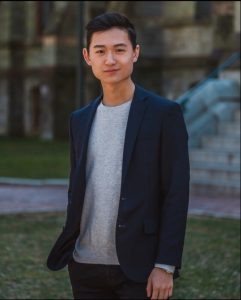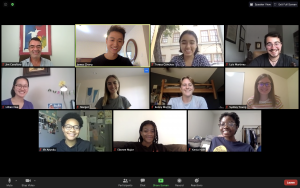This is part of series of posts by recipients of the 2020 Career Services Summer Funding Grant. We’ve asked funding recipients to reflect on their summer experiences and talk about the industries in which they spent their summer. You can read the entire series here.
This entry is by James Chang, COL ’22, recipient of the Turner Schulman Endowed Award
 This summer, I was granted the unique opportunity to be a part of the University Network for Human Rights’ Undergraduate Summer Intensive. The University Network for Human Rights’ mission is to facilitate supervised undergraduate engagement in the practice of human rights, a field that is prone to over-legalization despite having such universal relevance. This program is the first of its kind in the United States.
This summer, I was granted the unique opportunity to be a part of the University Network for Human Rights’ Undergraduate Summer Intensive. The University Network for Human Rights’ mission is to facilitate supervised undergraduate engagement in the practice of human rights, a field that is prone to over-legalization despite having such universal relevance. This program is the first of its kind in the United States.
During the first portion of the program, my cohort and I worked through a rigorous 4-week curriculum on contemporary human rights advocacy. Being the summer of Covid-19, the seminar had been adapted so that we would all congregate in a Zoom classroom each day for several hours. Guided by former Stanford Human Rights Clinic director James Cavallaro, we studied the evolution of the human rights movement, from the movement’s origins to its current incarnations. From Tolstoy, to Ta-Nehisi Coates, to modern giants in human rights discourse like HRW’s Ken Roth, we poured through piece after piece in a highly critical fashion. I developed not only a familiarity with the basics of human rights mechanisms/bodies, but also awareness of the limitations and structures of power within the movement. During this seminar portion, I was also able to work with the Tulane Environmental Law Clinic in an intensive R-software training to identify environmental health disparities in the U.S. using publicly available data.
Equipped with this training, I began work on real-world human rights advocacy campaigns sponsored by the University Network. Currently, I am involved in two on-going human rights projects: an environmental campaign affecting the Greater Chaco Region and a prison divestment coalition in my home state of Connecticut. While the exact details must be kept confidential (as project work will extend into 2020/2021 academic year), it has been an incredibly rewarding experience to be able to apply my training to the realities of human rights work. Working alongside University Network veterans, I am conducting policy research and working toward publishing two reports by next spring. Being in contact with directly-affected community members and partner NGOs on the ground has taught me to be a strategic but empathetic advocate. I have always been passionate about rights advocacy, having worked at various social justice nonprofits and at the Justice Department the previous semester, but this summer experience has been distinct in its dedicated commitment to these communities; the success and exposure of our work over the coming months has the potential to change the outcomes of real people’s lives. It is a shocking how under-publicized some of these regional issues are, which only demonstrates to me how necessary this kind of bottom-up advocacy is.

Being able to pursue this opportunity has not only been personally fulfilling thus far, but it has allowed me to deepen my professional commitment to rights advocacy. During my winter break, I plan to continue developing my skill set in a condensed practical training intensive hosted by the University Network in Northern California. If Covid-19 travel restrictions have been lifted, I also hope to go on physical fact-finding trips with the University Network during spring break, to the directly-affected regions in my projects. I am sincerely grateful for the financial assistance from Penn Career Services and the Turner Schulman Endowed Award in helping me travel and conduct advocacy for the University Network.




